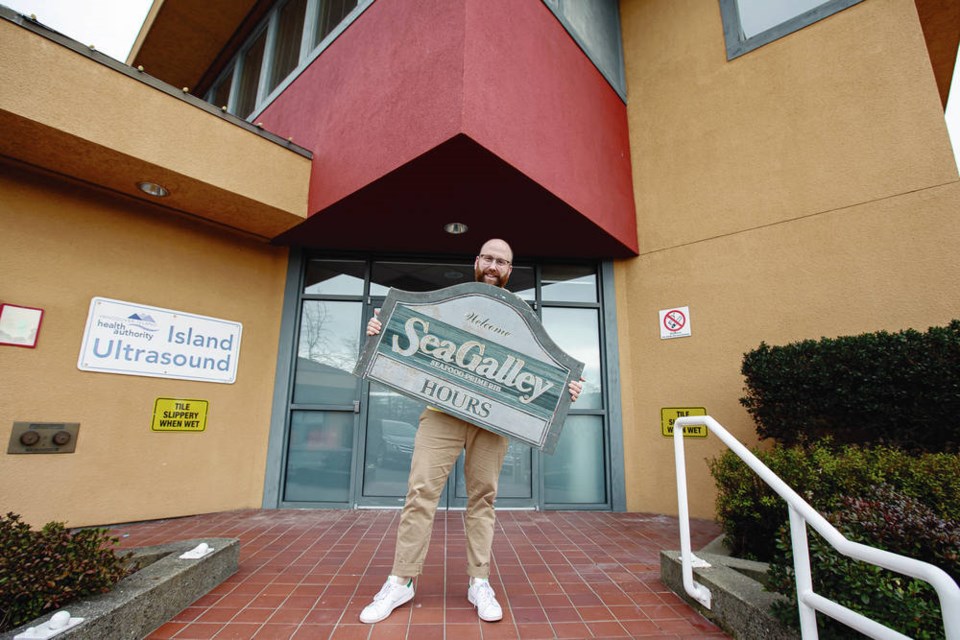“Remembrance of things past is not necessarily the remembrance of things as they were.”
— Marcel Proust
“Don’t believe everything you read on the Internet.”
— Abraham Lincoln
That last quote comes from a meme, of course. It’s meant to reinforce how much nonsense there is online, nonsense that gains credibility each time it’s repeated.
Which is why Colin McTaggart is happy to have the Sea Galley sign.
If that sentence makes no sense to you, well, you obviously haven’t been party to the never-ending debate over the name of the seafood restaurant that once stood at Vernon Avenue and Saanich Road. For the record, it was Sea Galley, though some insist a Red Lobster once stood there. “They will die on that hill,” says McTaggart of those who adhere to the latter belief.
The 39-year-old should know. A few years ago, he became Facebook famous for his efforts to reel in the Red Lobster red herring. Whenever it popped up on the Old Victoria site, McTaggart, who grew up near the Sea Galley and used to eat there with his family, would smack it down.
It became a running inside joke as McTaggart merrily waded into the online debate. “People have bought me Red Lobster gift certificates for my birthday.”
Sometimes, McTaggart says, he would even introduce the topic himself, stoking the fire as a diversion device, a certain way to change the subject when posts turned racist or otherwise ugly.
The whole debate dragged on so long that it became both locally legendary (at one point, McTaggart toyed with the idea of selling Victoria Red Lobster T-shirts of his own design) and tiresome. “It got old,” he says.
In the past couple of years, things died down.
But then, the other day, a friend called with exciting news: The old Sea Galley sign had emerged at the Six Mile Second Hand Store in View Royal. McTaggart raced down and bought it. “My wife has agreed that we can hang it in our kitchen.”
End of debate, right? Not necessarily. Plenty of people can’t let go of their memories of Red Lobster.
Perhaps they’re muddling together seafood, the Red Robin a few blocks down Blanshard, and old U.S. television commercials with all-you-can-eat shrimp pouring out of the screen.
If so, that sounds like an example of the Mandela Effect, a phenomenon in which large groups of people collectively remember things that never were, or that at least happened differently than recollected.
The name emerged in 2009, after it was discovered that many shared a vivid memory of the death of Nelson Mandela in a South African prison in the 1980s — a loss that was not so much tragic as illusory, seeing as how Mandela stayed upright until 2013.
Doctors point to the Mandela Effect as proof of how fallible our memories can be. Conspiracy theorists point to it as proof of an alternate universe.
In 2016, the New Statesman magazine ran a piece on the Mandela Effect, illustrating it with an anecdote about movie buffs who wax nostalgic over Shazaam, an early-1990s film starring the comedian Sinbad as an incompetent genie.
Some described the cover art on the videotape. One guy who worked at a video store remembered renting it out dozens of times.
Only one problem: No such movie was ever made. Sinbad dressed up for Sinbad the Sailor movies, and Shaquille O’Neal played a genie in a movie called Kazaam, but … Our minds can mix and match data to create false memories (the Monopoly millionaire never wore a monocle, but the similarly top-hatted Mr. Peanut did).
The thing is, erroneous beliefs gain credibility as they are repeated online. That’s why Barack Obama was forced to produce a birth certificate to refute the rumour that he was a Kenyan-born Muslim.
It’s what led to Pizzagate, the debunked theory about high-ranking U.S. Democrats running a child sex-trafficking ring, a bit of crackpottery that would have been funny were it not for the gullible fool who drove from North Carolina to a Washington, D.C., pizza parlour, where he fired his rifle in an attempt to free the children supposedly held there.
Last week, an email making the rounds rhymed off stats about Canada’s current crop of members of Parliament: “36 have been accused of spousal abuse … seven have been arrested for fraud…. 84 have been arrested for drunk driving in the last year.”
It took about 15 seconds to ascertain that the message A) was 20 years old, B) originally referred to the U.S. Congress, not Canada’s Parliament, and C) had been removed, with an apology, from the website upon which it first appeared.
Nonetheless, it continues to mutate and spread like a digital variant.
For the record, Red Lobster confirms it never had a presence in Victoria. The Sea Galley opened in the newly built Munro Centre at the northwest corner of Vernon Avenue and Saanich Road in the late 1980s. It stayed open until 1995, when it was briefly reinvented as a restaurant that lasted only a few months before closing its doors.
The name of that restaurant? Memory Lane.



